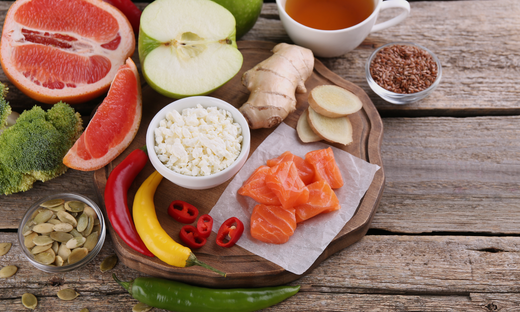15 Foods That Boost Metabolism Naturally

KEY TAKEAWAYS
- Thermic Effect of Food (TEF): Protein-rich foods like eggs and lentils significantly boost calorie burn during digestion, supporting efficient metabolism.
- Fat-Burning Compounds: Capsaicin in chili peppers and catechins in green tea help increase calorie expenditure and promote fat oxidation.
- Nutrient Synergy: Pairing foods like spinach and citrus enhances nutrient absorption, optimizing energy production and metabolic balance.
- Gut Health: High-fiber foods such as flaxseeds and legumes improve gut bacteria, aiding metabolism through better digestion and blood sugar regulation.
- Lifestyle Integration: Regularly eating metabolism-boosting foods alongside exercise amplifies results, supporting long-term wellness and energy stability.

Why Metabolic Meals are Important

Eating foods that enhance metabolism can be key to achieving and maintaining optimal health. Your metabolism determines how efficiently your body converts food into energy, affecting everything from weight management to energy levels. Incorporating metabolism-boosting foods into your diet can improve your body's ability to burn calories, support healthy digestion, and even regulate hormonal balance.
A well-functioning metabolism is vital for weight control and sustaining daily energy. Focusing on nutrient-rich foods designed to fuel your body gives you a natural advantage in meeting health goals. Understanding how specific foods impact your metabolism empowers you to make informed dietary choices that align with your wellness objectives.
15 Foods That Boost Metabolism Naturally

1. Chili Peppers (Capsaicin)
Chilli peppers are a powerful ally for those looking to boost their metabolism naturally—the secret lies in capsaicin, a compound that gives chilli peppers their signature heat. Capsaicin stimulates thermogenesis, a process where your body burns calories to produce heat. Consuming spicy foods can lead to a noticeable increase in your metabolic rate.
Research shows capsaicin enhances calorie burning and reduces appetite, making it easier to control portion sizes and resist overeating. Incorporating chilli peppers into your meals is a simple way to support weight management and increase energy expenditure. Adding a sprinkle of chilli flakes to your favourite dishes or experimenting with spicy recipes can enhance your metabolic health while delivering a flavorful kick to your meals.
2. Coffee (Caffeine)
Coffee isn’t just a beloved morning ritual—it’s a natural metabolism booster. Caffeine, the active ingredient in coffee, is known for its ability to enhance energy levels and stimulate the central nervous system. This stimulation can increase your resting metabolic rate, helping your body burn more calories even when inactive.
Studies have shown that caffeine can improve fat oxidation, breaking stored fat into energy. Additionally, coffee can enhance physical performance, making it a popular choice for pre-workout energy. Enjoy coffee in moderation without added sugars or heavy creamers for the best results and to keep it as metabolism-friendly as possible.
3. Green Tea (Catechins and Caffeine)
Green tea combines the metabolism-boosting benefits of caffeine with catechins, an antioxidant that enhances fat burning. These compounds work together to increase thermogenesis and improve your body’s ability to break down fat, particularly during exercise.
Regular consumption of green tea has been associated with improved weight management and increased calorie burning. It’s an excellent alternative to sugary beverages and provides a gentle energy boost without the jittery effects of high caffeine levels. Daily drinking a few cups of green tea can be a simple yet effective addition to a metabolism-focused lifestyle. It offers health and hydration benefits.
4. Fish (Rich in Omega-3 Fatty Acids and Protein)
Fish, especially fatty varieties like salmon, mackerel, and sardines, is a nutrient-dense food that supports metabolic health. Omega-3 fatty acids found in fish help regulate hormones responsible for metabolism and reduce inflammation, which can interfere with your body’s energy production processes.
Additionally, fish is an excellent source of high-quality protein, requiring more energy to digest than fats or carbohydrates. This thermic effect of protein can temporarily boost your metabolism after eating. Including fish in your weekly meal plan can improve your metabolic function, support heart health, and satisfy you after meals.
5. Spinach and Kale (High Iron Content)

Leafy greens like spinach and kale are rich in iron, an essential nutrient that plays a critical role in energy production and oxygen transport in the body. Adequate iron levels ensure your metabolism functions optimally, particularly during physical activity. These greens are also packed with fibre, which aids digestion and helps maintain a stable blood sugar level—an essential factor in preventing metabolic slowdowns.
Incorporating spinach and kale into smoothies, salads, or stir-fries is an easy way to reap their metabolism-enhancing benefits while adding essential nutrients to your diet.
6. Eggs (High-Quality Protein)
Eggs are a nutritional powerhouse, providing high-quality protein that supports muscle repair and maintenance. Protein has a higher thermic effect than other macronutrients, meaning your body burns more calories digesting and metabolizing protein-rich foods.
Eggs are also a source of essential vitamins and minerals, including B vitamins, crucial for energy production and a healthy metabolism. Starting your day with eggs can help keep you full and energized, making it easier to maintain a balanced diet and avoid unnecessary snacking.
7. Berries (Antioxidants and Fiber)
Berries like blueberries, raspberries, and strawberries are small but mighty in boosting your metabolism. They are loaded with antioxidants that combat oxidative stress, which can impair metabolic function. The high fibre content in berries also supports healthy digestion and stabilizes blood sugar levels.
Adding berries to your breakfast, snacks, or desserts satisfies your sweet tooth and contributes to your overall metabolic health. Their versatility makes them an easy addition to any meal plan.
8. Lentils and Legumes (Protein, Fiber, and Iron)
Lentils and legumes are metabolism-enhancing superstars. They offer a trifecta of protein, fibre, and iron. Protein boosts calorie burning through digestion, fiber keeps you full and regulates blood sugar, and iron supports oxygen transport and energy production.
Regularly including lentils and legumes in your meals can help improve digestion, reduce hunger, and provide long-lasting energy. Whether added to soups, salads, or as a side dish, lentils and legumes are an excellent choice for metabolic support.
9. Avocado (Healthy Fats)
Avocados are rich in monounsaturated fats, which support metabolic health by reducing inflammation and providing a steady energy source. They are also packed with essential nutrients like potassium and magnesium, which help regulate energy production.
Adding avocado to your meals can improve satiety, reduce unhealthy cravings, and keep your metabolism humming throughout the day.
10. Broccoli (Glucoraphanin and Fiber)

Broccoli contains glucoraphanin, which supports cellular metabolism and reduces oxidative stress. It’s also high in fibre, promoting digestion and stable blood sugar levels.
Consuming broccoli regularly can improve your body’s metabolic efficiency and contribute to overall health. Steam or roast it as a side dish, or incorporate it into casseroles and salads for a nutrient-packed boost.
11. Flaxseeds (Omega-3 and Fiber)
Flaxseeds are a small but impactful addition to a metabolism-focused diet. These seeds are rich in omega-3 fatty acids, which reduce inflammation and support efficient metabolic processes. They’re also packed with dietary fibre, helping to regulate blood sugar levels and keep your digestion on track.
Flaxseeds can help enhance metabolism while promoting heart and gut health. Including ground flaxseeds in meals such as smoothies, oatmeal, or baked goods is a simple way to harness their nutritional benefits.
Flaxseeds' combination of healthy fats, fibre, and essential nutrients makes them versatile ingredients that help keep metabolism and effective.
12. Brazil Nuts (Selenium for Thyroid Health)
Brazil nuts are an excellent source of selenium, essential for supporting thyroid function. Your thyroid plays a significant role in regulating your metabolism, and adequate selenium levels ensure it operates efficiently. One or two Brazil nuts daily provide enough selenium to meet your daily needs.
Brazil nuts are also a good source of healthy fats and protein, making them a satisfying snack that fuels your body while aiding metabolic processes. Including them in your diet can support thyroid health and promote overall energy balance.
13. Ginger (Improves Digestion and Thermogenesis)
Ginger is a potent natural remedy for improving digestion and stimulating thermogenesis, the body’s calorie-burning process. It contains compounds like gingerol and shogaol, which enhance metabolic activity and improve fat breakdown.
Ginger also supports a healthy gut by reducing inflammation and aiding nutrient absorption. It can be used in teas, smoothies, or as a flavorful addition to savoury dishes. Regular ginger consumption can improve digestion and promote a more active metabolism, making it a valuable addition to a wellness routine.
14. Cinnamon (Regulates Blood Sugar Levels)
Cinnamon is a metabolism-boosting spice that helps regulate blood sugar levels and improve insulin sensitivity. Stable blood sugar is key to maintaining a steady metabolism and preventing energy crashes.
This spice is also known for its thermogenic properties, encouraging the body to burn more calories during digestion. Adding a pinch of cinnamon to coffee, oatmeal, or baked goods can enhance flavour while supporting metabolic health. Cinnamon’s ability to improve blood sugar regulation and energy metabolism is a powerful tool in maintaining overall wellness.
15. Low-Fat Dairy Products (Calcium and Vitamin D for Muscle Mass)

Low-fat dairy products like yogurt, milk, and cheese are packed with calcium and vitamin D, critical for maintaining muscle mass and metabolic efficiency. Muscle tissue burns more calories at rest than fat, so preserving and building muscle is essential for a healthy metabolism.
Dairy products also provide high-quality protein, which supports muscle repair and keeps you satisfied after meals. Incorporating low-fat dairy into your diet can help you stay on track with your health goals while fueling your body with essential nutrients.
Benefits of Metabolism-Boosting Foods

Incorporating metabolism-boosting foods into your diet effectively enhances your health by optimizing calorie burn, energy production, and overall metabolic efficiency. These nutrient-dense options support weight management, improve digestion, stabilize blood sugar, and regulate hormonal balance. Scientific evidence supports the impact of these foods, which goes beyond calorie burning to address broader aspects of wellness.
Key Benefits of Metabolism-Boosting Foods
-
Enhanced Calorie Burn: Protein-rich foods like eggs, lean meats, and legumes significantly increase the thermic effect of food (TEF), requiring up to 30% of their calorie content for digestion. Capsaicin in chilli peppers triggers thermogenesis, temporarily boosting calorie expenditure, while catechins in green tea can increase daily calorie burn by up to 100 kcal.
-
Improved Energy Levels: Foods such as spinach, kale, and fish provide essential nutrients like iron and omega-3 fatty acids, which support energy production and combat fatigue. Selenium-rich Brazil nuts enhance thyroid function and are a key regulator of energy metabolism.
-
Weight Management Support: Metabolic-enhancing foods like avocado, flaxseeds, and ginger promote healthy weight loss and prevent overeating by increasing fat oxidation and improving appetite control.
-
Stable Blood Sugar Levels: Ingredients such as cinnamon and lentils stabilize blood glucose levels, preventing energy crashes and metabolic slowdowns. Oatmeal and berries also contribute to steady energy release throughout the day.
-
Better Digestive Health: High-fiber foods like broccoli, flaxseeds, and legumes improve gut health by supporting beneficial gut bacteria. These bacteria produce short-chain fatty acids, enhancing fat metabolism and regulating blood sugar.
-
Hormonal Balance: Selenium from Brazil nuts is essential for thyroid hormone production, ensuring optimal regulation of the metabolic rate. Iron from leafy greens supports oxygen transport, enhancing metabolic efficiency, especially during physical activity.
-
Increased Muscle Mass: High-protein foods like eggs, dairy, and lentils aid muscle repair and growth. Because muscle tissue burns more calories at rest than fat, maintaining or increasing muscle mass is critical for a higher resting metabolic rate.
Scientific Insights and Practical Applications
Metabolism-boosting foods are supported by solid scientific evidence. For example, protein’s TEF significantly outpaces carbohydrates or fats, while compounds like EGCG in green tea have demonstrated measurable increases in calorie burning. Additionally, the combination of fibre, antioxidants, and essential nutrients in foods like berries, flaxseeds, and broccoli creates a synergistic effect that benefits both metabolic health and overall wellness.
Practical Tips for Integration
-
Add chilli peppers or ginger to soups, stir-fries, or teas for a metabolism kick.
-
Pair spinach or kale with citrus fruits to improve iron absorption.
-
Use flaxseeds in smoothies, oatmeal, or yogurt for added fibre and omega-3s.
-
Include a serving of lean protein, such as grilled chicken or eggs, with each meal.
While individual foods can contribute to better metabolism, a holistic approach is essential. Combining these foods with regular physical activity, particularly resistance training, and maintaining a balanced diet amplifies their benefits. Together, these lifestyle strategies create a sustainable way to enhance metabolic efficiency, improve energy levels, and support long-term wellness.
For those seeking a more personalized approach to digestive health and overall wellness, Roots Nutrition offers expert-curated supplement packages tailored to your unique needs. Founded by Dr. Romeo Brooks, a pioneer in holistic health, Roots Nutrition combines decades of expertise in natural healing with scientifically-backed solutions. Discover how our natural supplements can support optimal digestion, detoxification, and vitality—empowering you to achieve your health goals.
Common Questions About Foods That Boost Metabolism Naturally
How do metabolism-boosting foods work?
Metabolism-boosting foods enhance your body’s natural ability to convert food into energy. They do this by leveraging properties such as high thermic effects, hormone regulation, and nutrient density. For instance, protein-rich foods require more energy to digest, while compounds like capsaicin in chili peppers stimulate calorie-burning processes. These foods can also stabilize blood sugar and improve gut health, which supports overall metabolic efficiency.
Can certain foods help you burn fat?
Yes, specific foods can help your body burn fat more effectively. Ingredients like green tea, which contains catechins, and omega-3-rich fish enhance fat oxidation and thermogenesis, encouraging your body to use stored fat as energy. Combining these foods with regular exercise further amplifies their fat-burning benefits, contributing to sustainable weight management.
Are metabolism-boosting foods effective without exercise?
While these foods can improve metabolic efficiency on their own, combining them with exercise yields the best results. Physical activity, particularly resistance training, increases muscle mass, which naturally raises your resting metabolic rate. However, nutrient-dense foods like eggs, spinach, and flaxseeds still support energy levels, digestion, and metabolic balance even without an active lifestyle.
How can I easily incorporate metabolism-boosting foods into my diet?
Simple changes can make a big difference. Add chili peppers or ginger to soups and stir-fries, sprinkle flaxseeds on oatmeal or smoothies, and use cinnamon to flavor coffee or yogurt. Pair iron-rich leafy greens with citrus fruits to maximize absorption, and ensure every meal includes a source of lean protein like eggs or fish.
Do metabolism-boosting foods help with energy levels?
Yes, many of these foods provide essential nutrients that fuel your body and stabilize energy levels throughout the day. For example, spinach delivers iron for better oxygen transport, and oatmeal paired with berries offers sustained energy by preventing blood sugar spikes. This combination can help you stay energized and focused.





